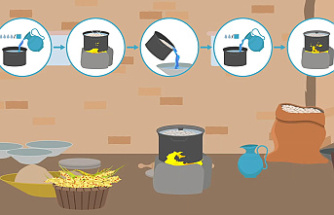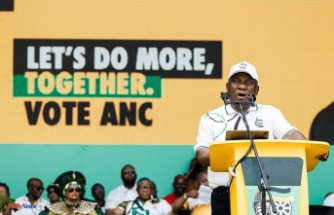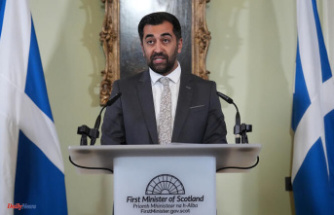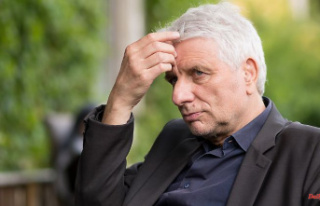He masters the musical bridge building like no other. On "Iconics" David Garrett once again devotes himself exclusively to classical music and the violinists he looks up to. He also talks to ntv.de about politics, the "dream ship", Christmas presents and what makes him happy.
ntv.de: We don't even know what to congratulate you on most: on your recently released album "Iconic", on the legendary violin that you recently bought at auction or even on your role in "Traumschiff" coming soon. What is currently making your heart beat faster?
David Garrett: violin, album and then the third - in that order. (laughs)
Then let's start with the third one: The "Traumschiff" episode with you was filmed a long time ago, but will only be broadcast now at Christmas. Did you feel comfortable in the role of the actor?
Oh, that's fun for me. It came about through a good friend who asked me if I would like to take part. We were right in the middle of the pandemic and it's in my blood to always do something. I don't like sitting still. So I agreed. But my tasks were then also limited.
I think you're playing yourself, aren't you?
I can't remember exactly. (laughs) But I don't want to anticipate anything about the story either. That's supposed to be surprising.
Then we come to the violin, an original Guarneri …
With her, of course, a lifelong dream of mine has come true! That's why I have to put it a bit before the album. I've dreamed of owning a Guarneri since I was eight years old. Waking up every morning now and being able to use the instrument is an amazing source of inspiration for me and makes me really, really happy every day.
You shelled out 3.5 million euros for the violin. They say you had to give up a condo in New York for it. How do you explain to other people that this isn't completely crazy?
For one, it was a damn good price. There is currently no violin of this type on the open market worldwide that is offered for less than ten million euros. Second, it's simply the ultimate and most wanted instrument. There are only 180 left worldwide. It is also no longer made - Guarneri del Gesù has been dead for almost 300 years. Apart from the dream of a lifetime, this violin is therefore also a very good investment. I could sell them for double that right now.
You say the violin isn't in a showcase or in a safe, you use it every day. Aren't you constantly afraid of rubbing shoulders with her somewhere?
(Garrett pats a violin case leaning against the wall behind him) She's here! No, I'm not worried about that. After all, I'm used to carrying good instruments around with me. I also traveled around the area for decades with a beautiful Stradivarius. I still have that. Now I also had the "Prince Doria" on loan from the museum in Cremona for one year, which is even insured for twelve million euros.
I assume the new violin can't be heard on your new album "Iconic" yet...
No, but the "Prince Doria" by Guarneri del Gesù, which by the way, like the violin I bought, dates from 1734. I borrowed them specifically for this album, also because I had the feeling that I had discovered a new facet in my playing that suited Guarneri del Gesù better. I also have the "Prince Doria" at home at the moment, but I'll be returning it at the beginning of next year
"Iconic" is a big title. What is iconic about the album?
The beginning of the 20th century was the golden age of violinists. Heifetz, Kreisler, Menuhin, Milstein, Szeryng - these are just a few of the names on a long list of really great icons of violin playing. As a young violinist, you grow up listening to their recordings and listening to them over and over. You motivate yourself with them and look up to them. It's no different than an eight or nine-year-old who plays football and takes Messi, Ronaldo or Zidane as a role model.
So it's kind of a trip back to your childhood...
Yes, now that I'm 42 years old and that I've also found my own self, my own musicality and my own sound, I wanted to remember that time again. And I wanted to hear the repertoire that these great violinists not only recorded on records but also presented at many concerts. Because these short, concise pieces, which were absolute hits back in the 1920s and 1930s and sold millions of copies, have been somewhat lost.
You speak of "great violinists". What actually makes a great violinist?
That's millions of little facets. The most important thing: to have your own tone and sound. I'll compare it to a voice: Christina Aguilera, Luciano Pavarotti, Maria Callas, Frank Sinatra or Elvis Presley - you can recognize them all after three or four notes. What makes these musicians so unique is the tone. There is a certain color in the voice, an extraordinary and unique vibrato that has never existed before.
How does this translate to playing the violin?
Bow speed plays a big role, for example, bow pressure and how hard you put your fingers on the string. In addition, there is how you phrase something, which arcs you use and which arcs of tension you build up. So you can interpret a very simple melody in umpteen ways. There are billions of possibilities. Finding one that is authentic and unusual, but still fits the music, is what makes a great violinist.
In this day and age, when asked about a great violinist, many will answer: David Garrett. Do you agree?
I know few musicians who would have the arrogance to call themselves great. I think the special thing about a good artist is that they don't overestimate themselves. Those who overestimate themselves are the ones who don't last long.
After a long time, "Iconic" is once again a pure classic album from you. Do you sometimes feel the need to make an album like this?
Absolutely! It was actually planned earlier, but then the pandemic came and it wasn't possible to record an album together with an orchestra. Nevertheless, I have of course always played classical music in recent years - every day at home or on tour. But now it was really time to record something again. It's true that it's been a while. It's all the better that it worked now and I can perform live with it next year.
Many die-hard classical music fans turn up their noses at so-called popular music...
Are they still doing this? Even if Gustavo Dudamel works with Beyoncé or Christina Aguilera? Or when Lang Lang performs with Metallica and records Disney albums? I do not think so.
You have long been characterized by the fact that you skillfully bridge the gap between classic, pop and rock. For you, do the musical varieties have equal standing next to each other or would you then attribute a different value to them?
No, absolutely not! The value lies in the play of the artist. I'm sure if Luciano Pavarotti had sung "Alle meine Entchen" it would have been great and I would have loved to listen to it. Opinions can be divided as to whether one prefers to hear "Alle meine Entchen" or an aria by Puccini or Verdi. But if you know what you are doing with the instrument or the voice, then it is always a high art.
How easy or how difficult is it for you to switch between a song like "All Days Is No Sunday", which you recorded two years ago with Till Lindemann, and an album like "Iconic"?
I don't play any worse on "All Days Is No Sunday" than when I record something for Deutsche Grammophon. The quality standard comes from me and not from the music. To call that less valuable would be total nonsense. Why should I approach this with less intelligence than classical music? For me there is only one level - and that is a good level.
Also on "Iconic" there are some guest musicians. Your former teacher Itzhak Perlman, for example, or Andrea Bocelli, who can be heard on Schubert's "Ave Maria" and with whom you have worked before...
I've even written something for him before, which he kindly recorded.
What characterizes your cooperation?
I come back to our previous conversation: You can recognize Andrea Bocelli by three tones. It's certainly debatable whether, in terms of volume, he's the tenor floating through the audience at the Met in New York. But he doesn't have to. He's a great singer in his own way and a living icon. For me he has an incredibly fascinating timbre and an originality in his voice, with which he managed to make the opera very popular.
Till Brönner can also be heard on the album with his trumpet. And you only have words of praise for him, too - not only when it comes to his musical skills...
Yes, I was really excited about what he did. I knew very well: If I send him "Hora staccato" he will swallow, because that is one of the virtuosic showpieces not only for the violin but also for the trumpet. In terms of dexterity and virtuosity on the trumpet, it ranks high. But he solved it exactly the way I imagined it, taking inspiration from the classical arrangement and solving it.
Also as a human you are full of praise for him. How important is the human component in such collaborations for you?
The most important! I can't work with people I can't get along with. Of course, if I had to, I would. But luckily I'm not in that position, I have the great luxury of being able to decide for myself. Of course, with a project like this I address people who I not only think are good musically, but with whom I also get along well.
Both of you are absolute specialists in your field - you as a violinist, he as a trumpeter. If you deal with music so intensively your whole life, do you actually become a multi-instrumentalist? Could you also play trumpet or piano?
I wish that were so. I could certainly get by with a few other instruments - just because I have the ear for it. But I have to leave the church in the village. I can still play the piano to some extent, but being able to play several instruments is a completely different talent. My sister, for example, can do that. That always fascinates me - like someone who can speak many different languages. I'm very good at one language, not so good at another and after that it starts to get thin. (laughs)
You have often spoken about your entire life with the violin - for example in your biography "If you knew". That wasn't just a cakewalk when you were a child. Looking back, do you sometimes wish things had gone differently?
No not at all. We wouldn't be sitting here if everything hadn't gone absolutely right. Our character as a human being is based 90 percent on our negative experiences and 10 percent on the positive. What annoys you and disappoints you makes you who you are. This is the foundation on which you ultimately build your humanity, but also your musicality. If there weren't so many obstacles in my way, I wouldn't be the musician I am today. I am absolutely convinced of that.
That everything is already quite good as it is is also shown by the fact that "Iconic" entered the top ten at number four - not exactly a matter of course for a classical album...
Totally crazy!
What do such chart successes mean to you?
This is balm for the soul and a huge gift for me as a musician. With every release you think: Was your previous success maybe just a mistake? Does it ever end? There's always one album or three or four albums that suddenly don't play anymore. How cocky would I be if I said: "No problem, it'll be fine." Of course, I'm all the happier when it makes the top ten. Top 20 would be okay too. But if I was in the top 30, I would probably have switched off the phone first. (laughs)
Political statements are usually not part of your repertoire. In view of the Russian attack on Ukraine, however, you positioned yourself, for example in the program "Maischberger". What made you do it?
On the one hand, because it is a political show. They invited me and I could decide whether to accept or not. On the other hand, of course, I have a direct connection because I am a quarter Ukrainian myself. My grandmother, who unfortunately no longer lives, came from Kyiv. I had a very close relationship with her and she told me a lot about her childhood in what was then the Soviet Union and the circumstances surrounding her escape from the USSR. In this respect, I felt a little bit at home with the topic.
You canceled a tour of Russia...
Yes, but that was clear. It's just not possible to perform in the Ukraine.
Under what circumstances can you imagine playing there again?
First the war must be over. Point. I think people have other concerns at the moment than worrying about a musician's concerts. Everything else only time will tell. For me it is still Russia and not Putin's country. There are also a lot of great people there who have accompanied my life for many years. And of course, like everyone else, I would be incredibly happy if people stopped killing themselves for a totally stupid goal like expanding borders. What nonsense these days.
In 2023 you will go on a live tour with "Iconic". But now Christmas is coming up. how do you celebrate
First time with my family. My dad will come, my mother is here in Berlin and I hope that my sister and her daughter will also make it to us. Then on Boxing Day it's off to the USA, where I also have part of my family: my brother with his two children, my sister-in-law and her dog. I'll probably spend January in the USA. I have an apartment there - and I would like to spend a little time there. (laughs)
Are you someone who has all the gifts together early on?
Not at all. Normally I rush to the KdW maybe a week before Christmas and have everything wrapped up nicely. (laughs) But I'm also someone who says: "Please don't give me anything!" However, I cannot convince my mother of this. It's just part of it and it's tradition.
We are here among ourselves: What are you giving your girlfriend?
I could imagine that it amounts to a journey. We love to travel and I like to give away trips. Something you can do together and where we grow together.
Volker Probst spoke to David Garrett
(This article was first published on Thursday, December 08, 2022.)












